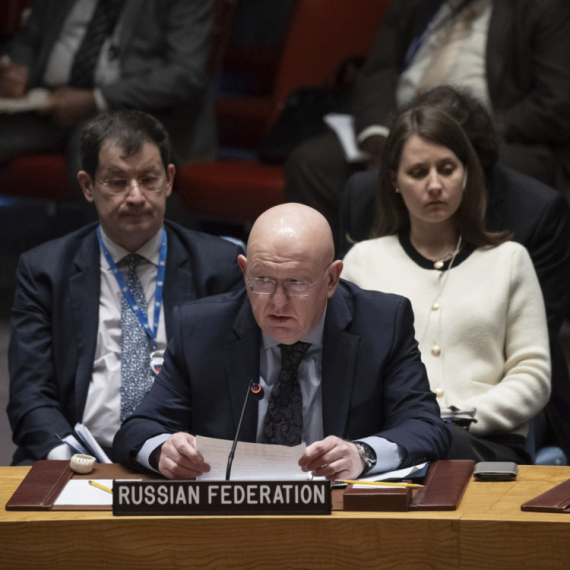"No peace in Balkans without agreement"
Slovakia's former FM Miroslav Lajčak says Thursday's ICJ Kosovo ruling cannot solve the "political problem of Kosovo".
Friday, 23.07.2010.
10:05

Slovakia's former FM Miroslav Lajcak says Thursday's ICJ Kosovo ruling cannot solve the "political problem of Kosovo". Lajcak, who also served as his country's ambassador in the Balkans, and as high internatonal representative in Bosnia, said he "cannot imagine peace in the Balkans without an agreement between Belgrade and Pristina. "No peace in Balkans without agreement" "I see a solution to the problem in the political, rather than in the legal plane. This advisory opinion can help, but it cannot solve the problem, which is of an entirely political character," Lajcak told Slovakia's TA3 television outlet. The ICJ judges said that the Kosovo Albanian unilateral independence declaration, rejected by Serbia, did not breach international law since there was no active provision that limited such proclamations. However, the court's advisory opinion did not make a statement on the right to self-determination or secession. Lajcak believes that the ruling might result in some new recognitions of Kosovo, but that it would not solve its problem, or that of the region. "I wish to emphasize that a solution to the Western Balkans problem depends on whether there some form of relations between Serbia and Kosovo will be found that suit both sides. Without that, I cannot imagine either peace or progress of the the region toward the EU," he said. Lajcak also added that he expected the Kosovo issue to be reopened at the UN Security Council. Meanwhile, the government in Bratislava announced that Slovakia's position will not be affected by the advisory opinion of the International Court of Justice (ICJ). The Slovak Ministry of Foreign Affairs confirmed this on Thursday evening. Ministry spokesman Peter Stano said that Slovakia will continue to base its position on the Resolution 1244 of the UN Security Council, whereby Kosovo will be under the supervision of the UN administration until the international status of the province is resolved by an agreement between Belgrade and Pristina or by the decision of the UN SC. Slovakia is one of five EU member-states that have not recognized Kosovo. Other countries that have not done so are Cyprus, Greece, Romania and Spain. BBC reports that a Spanish foreign ministry spokesperson said Madrid respected the court ruling, but would not be drawn on whether it would lead Spain to reconsider its decision on non-recognition. Cyprus reaffirmed its support for Serbia's sovereignty and territorial integrity which includes the Kosovo and Metohija province. Miroslav Lajcak (Beta, file)
"No peace in Balkans without agreement"
"I see a solution to the problem in the political, rather than in the legal plane. This advisory opinion can help, but it cannot solve the problem, which is of an entirely political character," Lajčak told Slovakia's TA3 television outlet.The ICJ judges said that the Kosovo Albanian unilateral independence declaration, rejected by Serbia, did not breach international law since there was no active provision that limited such proclamations. However, the court's advisory opinion did not make a statement on the right to self-determination or secession.
Lajčak believes that the ruling might result in some new recognitions of Kosovo, but that it would not solve its problem, or that of the region.
"I wish to emphasize that a solution to the Western Balkans problem depends on whether there some form of relations between Serbia and Kosovo will be found that suit both sides. Without that, I cannot imagine either peace or progress of the the region toward the EU," he said.
Lajčak also added that he expected the Kosovo issue to be reopened at the UN Security Council.
Meanwhile, the government in Bratislava announced that Slovakia's position will not be affected by the advisory opinion of the International Court of Justice (ICJ).
The Slovak Ministry of Foreign Affairs confirmed this on Thursday evening.
Ministry spokesman Peter Stano said that Slovakia will continue to base its position on the Resolution 1244 of the UN Security Council, whereby Kosovo will be under the supervision of the UN administration until the international status of the province is resolved by an agreement between Belgrade and Priština or by the decision of the UN SC.
Slovakia is one of five EU member-states that have not recognized Kosovo. Other countries that have not done so are Cyprus, Greece, Romania and Spain.
BBC reports that a Spanish foreign ministry spokesperson said Madrid respected the court ruling, but would not be drawn on whether it would lead Spain to reconsider its decision on non-recognition.
Cyprus reaffirmed its support for Serbia's sovereignty and territorial integrity which includes the Kosovo and Metohija province.
















Komentari 19
Pogledaj komentare